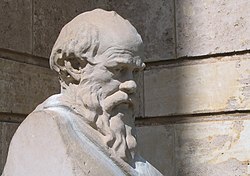
Back أعرف أني لا أعرف شيئا Arabic Mən bilirəm ki, mən heç nə bilmirəm Azerbaijani I woass, dass i nix woass BAR Аз знам, че нищо не знам Bulgarian Només sé que no sé res Catalan Ich weiß, dass ich nichts weiß German Εν οίδα ότι ουδέν οίδα Greek Solo sé que no sé nada Spanish Ezer ez dakit, ezer ez dakidala baizik Basque دانم که ندانم Persian
| Part of a series on |
| Socrates |
|---|
 |
| Eponymous concepts |
| Pupils |
| Related topics |
|
|
"I know that I know nothing" is a saying derived from Plato's account of the Greek philosopher Socrates: "For I was conscious that I knew practically nothing..." (Plato, Apology 22d, translated by Harold North Fowler, 1966).[1] It is also sometimes called the Socratic paradox, although this name is often instead used to refer to other seemingly paradoxical claims made by Socrates in Plato's dialogues (most notably, Socratic intellectualism and the Socratic fallacy).[2]
This saying is also connected or conflated with the answer to a question Socrates (according to Xenophon) or Chaerephon (according to Plato) is said to have posed to the Pythia, the Oracle of Delphi, in which the oracle stated something to the effect of "Socrates is the wisest person in Athens."[3] Socrates, believing the oracle but also completely convinced that he knew nothing, was said to have concluded that nobody knew anything, and that he was only wiser than others because he was the only person who recognized his own ignorance.
- ^ Plato. Plato in Twelve Volumes, Vol. 1 translated by Harold North Fowler; Introduction by W.R.M. Lamb. Cambridge, MA, Harvard University Press; London, William Heinemann Ltd. 1966.
- ^ "Socratic Paradox". Oxford Reference. Retrieved 19 November 2021.
- ^ H. Bowden, Classical Athens and the Delphic Oracle: Divination and Democracy, Cambridge University Press, 2005, p. 82.
© MMXXIII Rich X Search. We shall prevail. All rights reserved. Rich X Search